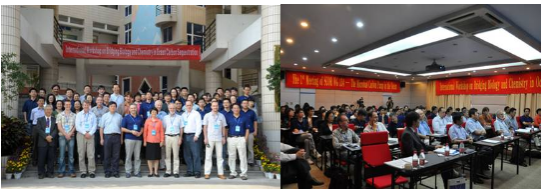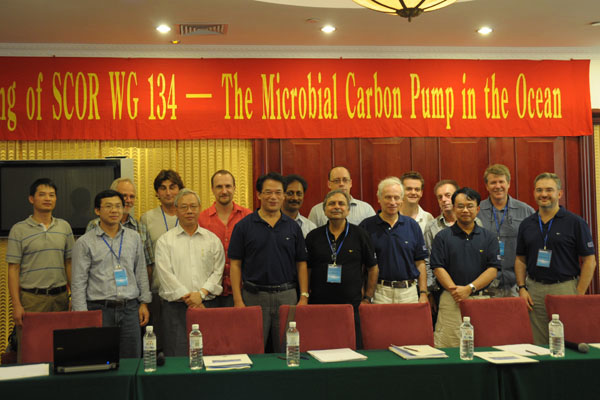The first meeting of SCOR Working Group (WG) 134 was held in Xiamen, China during October 27-30, 2009. With the theme of "Bridging Biology and Chemistry in Ocean Carbon Sequestration" the meeting was composed of two sessions, the Open Science Meeting (Session I) and the Closed Workshop (Session II). Session I was aimed at multidisciplinary exchange regarding ocean carbon sequestration, and Session II was focused on the missions of the working group on microbial carbon pump.
The Open Science Meeting was convened by Prof. Nianzhi Jiao (State Key Lab for Marine Environmental Science, Xiamen University, China), and joined by 20 experts from 10 countries, including China, USA, Germany, France, Canada, Spain, the Netherlands, Denmark, Czech and India. Besides the WG134 members, more than 50 Chinese scientists and students participated in the Open Science Meeting.
Focusing on the theme of "Bridging biology and chemistry in ocean carbon sequestration" the presentation topics covered a broad range of relevant science (from concepts to observations), organisms (bacteria, archaea, virus etc.), techniques (from molecular biomarkers to metagenomic chips; from analytical approaches to numerical modeling), spatial scale (from surface to bathypelagic, from nano-scaled microbial processes to carbon cycling in the global oceans) and time scale (from paleo to current climate changes).
Participants shared the cutting-edge ideas about the conceptual framework of the microbial carbon pump, DOC as a sink/source of CO2, transformation of DOC, as well as linkages between biological and abiotic processes regarding carbon cycling in the ocean.

On the theme of "The microbial carbon pump (MCP)" the closed workshop was convened by Prof. Nianzhi Jiao ( Xiamen University , China)and Prof. Farooq Azam(Scripps Oceanography Institution, USA). The panel members had active discussions regarding MCP related issues, and hypothesized that a context of MCP with related abiotic processes is central for the understanding of carbon cycling and sequestration in the ocean.
Terms of reference of WG134 was revised and discussed regarding the missions of the working group. Relevant scientific questions and techniques were reviewed.
One of the concerns is the definition of RDOC (refractory/recalcitrant dissolved organic carbon) which is critical for "bridging biology and geochemistry in ocean carbon sequestration". Currently, different definitions by different disciplines have been used in literature. In marine geochemistry, RDOC refer to the old DOC with radiocarbon age of 4000-6000 yr, while in marine ecology and microbial oceanography, RDOC is referred to as the DOC that is resistant to biological utilization. In practice, both definitions are operational, and are referred to different materials on different time scales. Thus the different definitions are confusing for cross-disciplinary understanding of the scientific points.
Bridging such gaps should be one of the missions of WG134. The MCP conceptual framework provides a linkage between the two definitions, that is, after the MCP selective processes of the organic matter under certain abiotic conditions; the biologically defined RDOC could ultimately become the geochemical defined RDOC over time. The WG has the advantage of joint efforts from multi-disciplines, the panel members have planed to write a few review papers on RDOC and MCP related theories.
Another mission of the WG134 is to document the state-of-the-art techniques and parameters addressing microbial processing of organic carbon, and establish /standardize key protocols for the essential observation/measurements. In order to reach this goal, a microbial subgroup led by Prof. Gerhard Herndl (Royal Netherlands Institute for Sea Research, the Netherlands and University of Vienna, Austria), and a geochemical subgroup led by Gerhard Kattner (Alfred Wegener Institute, Germany) were set to facilitate addressing the detailed targets. The outcome of these efforts would be a protocol book or practical handbook on measurements of the key parameters.
Recommendations for future research related to the MCP in the ocean were also touched. Collaborations among individual labs have got started at the WG meeting, which would be the basis for further development of collaborations at a higher level.
The next WG134 meeting is decided to be held before the ASLO meeting in Porto Rico in Feb. 2011.

(Editing Contact:xjz@xmu.edu.cn)